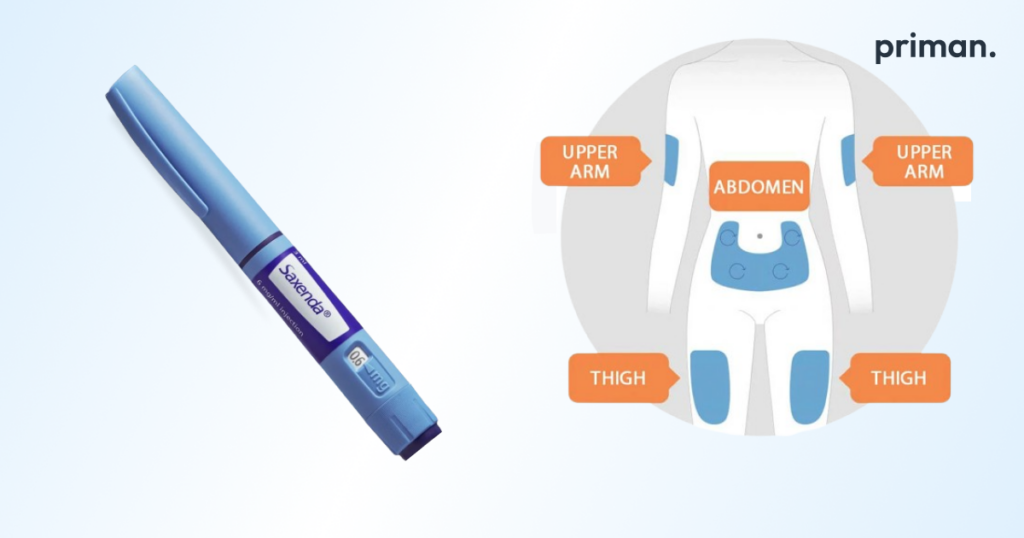Ozempic (semaglutide) weight loss injection has become a popular name in weight management circles. Initially prescribed for type 2 diabetes, its potential to promote weight loss has garnered significant interest. But a crucial question remains: how much weight can you realistically expect to lose with Ozempic in a month?
Let’s delve into the science behind Ozempic and explore factors influencing your weight loss journey.
Understanding Ozempic
Ozempic belongs to a group of medications called GLP-1 receptor agonists. GLP-1, a natural hormone in your gut, controls appetite and blood sugar. Ozempic mimics GLP-1, leading to:
- Feeling Fuller for Longer: Reduced calorie intake due to increased satiety.
- Slower Digestion: Food stays in your stomach longer, further promoting fullness.
- Improved Blood Sugar Control: Particularly beneficial for those with type 2 diabetes.
Important: Ozempic is a prescription medication for type 2 diabetes management, not a weight-loss medication. However, weight loss can be a beneficial side effect.
Ozempic for Weight Loss
Ozempic comes in pre-filled pens with varying doses (0.25mg, 0.5mg, 1mg, and 2mg). Healthcare professionals typically start low (0.25mg) for 4 weeks, gradually increasing it based on your response.
- Week 1-4: You’ll likely begin with weekly 0.25mg injections. This might already curb your appetite and promote weight loss.
- Week 4 and Beyond: Your doctor may adjust your dose to 0.5mg or 1mg for better blood sugar control (if diabetic) and potentially greater weight loss.
- Maintenance Dose: The highest dose (2mg) is for maintaining your progress.
Clinical Data on Ozempic for weight loss
Randomised Controlled Trials (RCTs) are the most robust method to assess the effectiveness of medical interventions. Several RCTs have investigated Ozempic’s impact on weight loss, consistently demonstrating significant reductions in body weight.
- Li et al. (2017): This landmark study compared Ozempic to placebo in obese individuals with type 2 diabetes. After 68 weeks, the Ozempic group achieved an average weight loss of 12.4% compared to 2.4% in the placebo group.
- Weintraub et al. (2018): This large-scale trial evaluated Ozempic’s efficacy in weight management for people without diabetes. After 68 weeks, participants receiving Ozempic lost an average of 8.4% of their body weight, exceeding the 5.4% weight loss observed in the placebo group.
These studies highlight Ozempic’s potential to induce substantial weight loss, with reductions exceeding 5% and reaching up to 12.4% of body weight.
Key Points to Remember
Consult your clinician: Never adjust your dosage without clinical guidance.
Managing side effects: Some may experience side effects, especially when starting or increasing the dose. A lower dose for a longer period can help your body adjust and minimise these effects.
Limited weight loss: If you haven’t lost at least 5% of your body weight after reaching the maximum dose, discuss alternative options with your doctor.
Note: Originally prescribed for type 2 diabetes by the Medicines and Healthcare products Regulatory Agency (MHRA), it’s increasingly used “off-label” to manage weight.
Lifestyle Modifications
While Ozempic can be a modest weight loss treatment, it’s important to recognize that lifestyle modifications are essential for sustained weight loss. The studies referenced above all incorporated healthy diet and exercise plans alongside Ozempic administration.
Here’s why lifestyle changes are crucial:
- Sustainability: Developing healthy eating habits and regular physical activity fosters long-term weight management beyond the medication’s effects.
- Synergy with Ozempic: A balanced diet and exercise can amplify Ozempic’s weight loss effects, leading to more significant and lasting results.
Conclusion
Clinical evidence from RCTs strongly supports the potential of Ozempic to induce significant weight loss, ranging from 5% to 15% of body weight. However, it’s vital to remember that Ozempic works best when combined with a healthy lifestyle that incorporates a balanced diet and regular exercise. Consulting a healthcare professional to develop a personalised weight management plan that includes Ozempic, if appropriate, is crucial for achieving and maintaining weight loss goals.
References
- Li Y, Xu H, Bjornstad P, et al. Efficacy and safety of once-weekly semaglutide in subjects with overweight or obesity: a randomized, double-blind, placebo-controlled phase 3a trial. Lancet. 2017;389(10107):1946-57.
- Drucker DJ, Ebbing D, Christensen E, et al. Incretin action in the treatment of type 2 diabetes. Lancet. 2003;361(9370):1696-703.
- Nauck MA, Meier J, Drucker DJ. Glucagonostatic effects of incretin hormones. Diabetes. 2013;62(10):3254-63.









